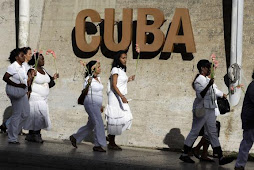Cuban communists OK term limits for party and government officials
At the Cuban Communist Party's first national conference, term limits
are approved for government and party officials.
By Juan O. Tamayo
jtamayo@ElNuevoHerald.com
Cuba's Communist Party Sunday cleared the way for a long-term renovation
of its Central Committee that might hint at the island's future leaders,
while Raúl Castro issued a strong call for openness within the party and
mass media — but only up to a point.
Closing a first-ever National Conference of the party, Castro as
expected also confirmed that party and government officials will be
limited to two five-year terms. He and brother Fidel have ruled Cuba
since 1959.
Conference delegates also unanimously approved replacing up to 20
percent of the 115 Central Committee members over the next five years, a
move that could shine a spotlight on younger leaders that will succeed
the 80-year-old Castro.
Overall, however, the two-day conference fulfilled Castro's caution
earlier this month that Cubans should not have too many "illusions"
about the two-day, closed-door gathering of more than 800 delegates.
Castro spoke several times about the need to support and carry out the
ambitious open-market reforms approved in April by a party congress —
its supreme form of gathering — to rescue the Soviet styled economy from
the doldrums.
The Central Committee will hold two plenum meetings per year to watch
over the reforms as well as the annual budgets and production goals and
keep them from "falling into a broken bag," he announced.
Castro also punched away at one of his complaints at virtually every one
of his public appearances — the corruption at virtually every level of
Cuban life that has been undermining his efforts at reforms.
"Corruption is "one of the principal enemies of the revolution, much
more prejudicial than the subversive and meddlesome programs of the U.S.
government," he declared, referring to Washington's pro-democracy
programs in Cuba.
"The party will definitively assume the conduct" of the fight against
corruption, he added, without giving details. Castro created the post of
comptroller general after he assumed power to crack down on the corruption.
He urged party members to become more "democratic" and openly debate
Cuba's myriad problems, adding that to abandon the island's one-party
system would be "to legalize the party or parties of the [U.S.] empire."
Cuba's mass media, all party or state controlled, need to report on the
debate "with responsibility and the most strict veracity," he added,
"not in the bourgeois style, full of sensationalism and lies, but with
proven objectivity and without useless secretiveness."
During the 40-minute address, Castro also ground away at party issues
like the need for hard work, ethics and discipline, and he told party
officials to not meddle in decisions that should be left up to the
government officials.
"The only thing that can defeat the revolution and socialism in Cuba
would be our incapacity to correct the errors committed in the last 50
years … and those that we could make in the future," Castro declared.
Marino Murillo, the island "reform tsar" in charge of guiding and
enforcing the economic changes, was quoted as acknowledging that more
changes are needed but adding "that there's a limit — the socialist
system is untouchable."
And delegate Yosvani Verdial was quoted as saying that while the party
wants young members, "we want youths who are committed, who are
patriots, who are unconditional" supporters of the communist system.
One intriguing report noted that Castro's daughter Mariela Castro, who
was not a delegate but was invited to address a Conference working
group, had proposed amending a document to use the word "dialogue," a
word much disliked by the government.
Mariela proposed "including the word in a direct way, where it had
appeared more implicitly," Arleen Rodriguez Derivet, a journalist who
runs the nightly public affairs TV show Mesa Redonda, wrote in the
government's CubaDebate Web page.
Rodriguez added that if she herself had been a delegate, she would have
approved the change, but gave no details on whether the change was
approved, or how the word would have affected the document.
Castro's daughter, who heads the Cuban National Center for Sex
Education, has at times said she favors more and faster changes in Cuba,
and at times fiercely defended the communist system and her father's rule.
In another odd line in her report, Rodriguez asked whether the work of
the Conference could be seen as "social engineering?" Soviet dictator
Joseph Stalin's goals for creating selfless communists were often
referred to as "social engineering."
José Ramón Machado Venture, No. 2 to Raúl Castro in both the government
and the party, noted that nearly 43 percent of the delegates were women
and 37.5 percent were black or "mestizo," percentages higher than in the
party's 800,000 members.
http://www.miamiherald.com/2012/01/29/2614707/cuban-communists-ok-term-limits.html





No comments:
Post a Comment